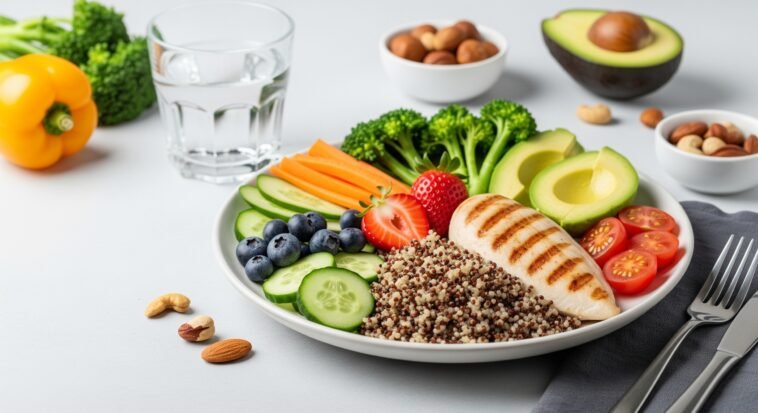
Ever get those “butterflies” in your stomach before something big? Or feel queasy when you’re stressed?
That’s not random—it’s your gut and brain chatting behind your back.
Turns out, your digestive system helps make serotonin, the same chemical that keeps your mood in check.
Yep, the “feel-good” stuff isn’t just made in your brain—it’s also brewed in your belly.
Scientists now call this the gut-brain axis, and it’s like the ultimate group chat between your gut, brain, and emotions. Think of your gut as the secret DJ controlling your mental playlist—if it’s off, your mood might be too.
The Gut-Brain Axis: Your Second Brain
Did you know your gut is basically running a side hustle as a second brain?
No joke—your digestive system has about 100 million neurons, more than your spinal cord.
It’s called the enteric nervous system, and it talks to your brain all day long via the vagus nerve (basically their Wi-Fi connection), hormones, and immune signals.
Scientists call this whole setup the gut-brain axis—a fancy way of saying your stomach and brain are in constant DMs.
And get this: your gut doesn’t just follow orders—it has a mind of its own.
It can even work independently of your brain, which makes it kind of like that overachieving coworker who doesn’t wait for directions.
The Microbiome’s role in mental health
Inside your gut lives a wild crowd of trillions of bacteria, fungi, and microbes—aka your microbiome.
These tiny creatures don’t just help with digestion; they also help make brain chemicals like serotonin, fight off inflammation, and keep your mental game strong.
When your gut bugs are balanced and vibing, they support your mood.
But if things get messy down there (scientists call it dysbiosis, we call it chaos), it can mess with your head—literally.
Studies show that a cranky gut can raise your chances of anxiety and depression.

Serotonin: The Happiness Chemical Made in Your Gut
We usually blame (or thank) the brain for our moods, but plot twist—around 95% of your serotonin is actually made in your gut.
Yep, your digestive system is cranking out the feel-good stuff like it’s got its own wellness startup.
Serotonin essential functions
This multitasking molecule isn’t just about smiles and sunshine. Here’s what it really does:
- Mood: It’s your inner emotional DJ—keeps you calm, balanced, and not rage-texting your ex.
- Sleep: Helps you fall asleep and stay asleep without needing to binge melatonin gummies.
- Appetite: Sends those “I’m full” signals so you don’t eat a whole pizza “by accident.”
- Digestion: Keeps things moving in your gut. Literally.
- Brainpower: Helps with memory, learning, and not spacing out during meetings.
How your gut produces serotonin
It all starts with tryptophan—an amino acid your body can’t make on its own, so you’ve got to eat it (turkey, eggs, nuts, tofu, etc.).
Once it’s in your system, special gut cells (called enterochromaffin cells—science flex) turn it into serotonin.
But here’s the twist: your gut bacteria are like the crew behind the scenes. They:
- Make enzymes that turn tryptophan into serotonin
- Help make tryptophan more available
- Keep inflammation down (because inflammation is serotonin’s mood-killing nemesis)
- Support the health of the cells doing the heavy lifting
Foods That Boost Serotonin Production
Want to feel better without jumping straight to supplements? Start with your food.
Your body makes serotonin (a.k.a. your brain’s feel-good fuel) from tryptophan—a special amino acid you only get through eating.
But here’s the twist: your gut bacteria are part of the process too. Feed them well, and they’ll help keep your mood in check.
Tryptophan-rich foods
Tryptophan is the starter pack for serotonin. Here’s where to get it:
- Protein: Turkey, chicken, salmon, tuna, eggs, lean beef. Think of them as the Avengers of mood support.
- Dairy: Milk, yogurt, cheese—especially if they’ve got live cultures. Bonus points for helping your gut and your mood.
- Plant-based picks: Pumpkin seeds, sunflower seeds, walnuts, almonds, tofu, lentils. Great options for meat-free moods.
- Leafy greens: Spinach, kale, chard—loaded with nutrients that help build neurotransmitters. Basically, the green juice your serotonin wants.
Gut-supporting foods for enhanced serotonin
Tryptophan can’t do its job if your gut’s out of sync.
These foods keep your gut bacteria happy so they can help with serotonin production:
- Fermented foods: Yogurt with live cultures, kefir, kombucha, kimchi, sauerkraut. Your gut loves these like Swifties love surprise tracks.
- Prebiotic: Garlic, onions, bananas, asparagus, Jerusalem artichokes—these are like gut fuel for the good bacteria behind the scenes.
- Omega-3s: Salmon, flaxseeds, chia seeds, walnuts. They fight inflammation and help your brain stay cool under pressure.
- Complex carbs: Oats, quinoa, sweet potatoes, brown rice. These help tryptophan cross into the brain like it’s got an all-access pass.
Strategic food combinations
Want to give tryptophan a clear path to the brain? Combine it with carbs.
Carbs trigger insulin, which clears out other amino acids so tryptophan can slide through.
Try these combos:
- Oatmeal with seeds and berries
- Turkey on whole grain bread
- Greek yogurt with granola and fruit
- Salmon with quinoa and roasted veggies

Practical Strategies for Gut-Brain Optimization
You don’t need a full lifestyle makeover to keep your gut and brain on speaking terms.
Just a few small moves can help boost your mood and digestion without making you feel like you’re living in a wellness cult.
The 80/20 approach
Try to eat healthy most of the time—say, 80%—and let yourself enjoy the occasional donut or fries without guilt.
Your gut and your sanity will thank you.
Stressing over food is worse for your gut than the food itself.
Meal timing and frequency
Your gut loves a schedule.
Eat around the same times each day so your body doesn’t freak out and your serotonin production stays steady.
Skipping meals or eating at random hours? That’s like leaving your gut on “read.”
Mindful eating practices
Rushing through lunch while doomscrolling? Yeah, your gut hates that.
Eating under stress slows digestion. Try this instead:
- Breathe before you eat (seriously—just a couple deep ones)
- Chew like you’re trying to win an Oscar for “Most Intentional Chewer”
- Ditch the distractions—no emails, no TikTok, no drama
- Say thanks for the food, even silently. It helps calm your nervous system.
Hydration and gut health
Your gut needs water to break things down and absorb nutrients.
Sip clean water throughout the day. Bonus tip: a tiny pinch of sea salt in your water can help with electrolyte balance if you’re feeling extra wellness-y.
Lifestyle Factors That Enhance the Gut-Brain Connection
Yeah, food matters—but your gut-brain connection is also about how you move, sleep, and handle stress. It’s all connected.
Think of it like a group chat between your gut, brain, and nervous system.
If one’s out of whack, the whole vibe goes off.
Move a little, help your microbes party
No need to hit beast mode at the gym.
Just walking regularly—yes, even to get coffee—helps your gut bugs thrive and boosts your serotonin.
Every step you take is like pressing play on your inner serotonin playlist.
Sleep: your gut’s night shift
When you sleep, your gut does the cleanup and reset.
But if you’re up too late binge-watching Stranger Things (again), your gut pays the price.
Aim for 7–9 hours and keep your bedtime consistent—even on weekends. Your microbes love a routine.
Chill out: Stress wrecks your gut
Stress doesn’t just mess with your head—it hits your gut, too.
It changes your gut bacteria, weakens your gut lining, and throws serotonin off balance.
Basically, it’s your gut’s least favorite thing.
Here’s how to hit the brakes:
- Do a quick 3-minute meditation (even if you’re skeptical, just try it)
- Breathe deep—smell the cookies, blow out the candles
- Text someone instead of doomscrolling
- Move your body (yep, again)
- Take a real break—like, no screens, no multitasking, just chill

When to Seek Professional Guidance
Look, tweaking your diet, moving your body, and chilling out can do wonders—but sometimes, gut-friendly smoothies and yoga just aren’t enough.
If things still feel off, it might be time to tag in the experts.
Here’s when you shouldn’t just “wait it out”:
- Your mood swings are messing with work, relationships, or life in general
- You’ve got stomach drama (bloating, pain, weird bathroom stuff) plus you’re feeling low or anxious
- Anxiety or depression hits hard and won’t back off
- You’re suddenly not sleeping or eating like your usual self
- You feel tired all the time even after making healthy changes
That’s your cue to loop in a pro—think therapists, dietitians, gut doctors (aka gastroenterologists), or holistic docs who get the whole gut-brain thing.
They can help figure out what’s actually going on and build a game plan that doesn’t involve guessing or Googling symptoms at 2 a.m.
Taking Action: Your Gut-Brain Wellness Plan
Ready to boost your mood from the inside out?
Here’s a simple, no-stress plan to get your gut and brain working together like besties:
- Weeks 1–2: Eat more tryptophan-rich foods (turkey, tofu, eggs, seeds). Cut back on ultra-processed stuff. Basically, less junk, more mood fuel.
- Weeks 3–4: Add in fermented foods (hello, kimchi and yogurt) and prebiotic veggies like garlic, onions, and bananas. Your gut bugs will throw a party.
- Weeks 5–6: Eat at regular times, slow down while you eat, and maybe stop eating lunch while doomscrolling.
- Keep going: Move your body, sleep like it matters, and actually do the stress relief stuff (yes, even breathing counts).
Gut changes take time, so don’t expect instant magic.
But with consistency, your gut will reward you with better moods, energy, and maybe fewer 3 a.m. existential crises.



